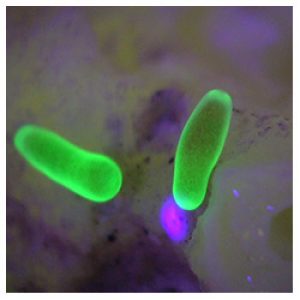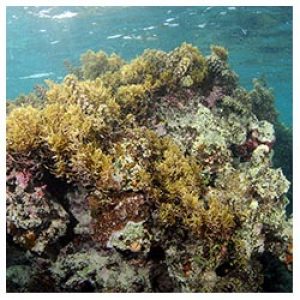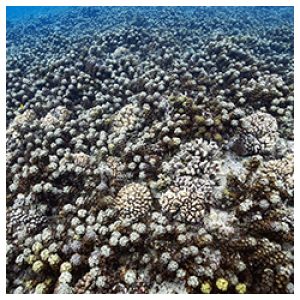Coral reefs are the most biologically diverse and productive shallow water marine ecosystem on Earth, supporting 25 % of all marine fish in less than 0.1 % of the world’s ocean surface, and providing many ecosystem services to coastal communities. Despite their great value, these ecosystems are deteriorating rapidly, with a massive decline in living corals across all oceans. This decline poses a real threat for human societies because it is the scleractinian corals that provide the biogenic physical structure that underpins the existence of coral reef communities.
Coral recruitment is the process by which young corals undergo larval settlement and become part of the adult population. Reef-building corals produce larval offspring that develop in the open water for hours to months before settling and metamorphosing on a suitable substrate. Until relatively recently, dispersing larvae were considered passive particles, yet contemporary evidence demonstrates that even weakly swimming invertebrate larvae such as coral planulae are active participants in the process of dispersal and recruitment. Their fitness is linked to the health of their parents and they can change their swimming behaviour and select or reject attachment sites in response to a suite of physical, chemical and biological factors over multiple scales.
Goal
The goal of CoralMates is to identify the key players (from organisms to molecules) influencing coral recruitment to aid reef recovery and sustain ecosystem resilience. What are the positive and negative players influencing coral recruitment? What are the chemical and microbial mechanisms driving these interactions? How do local and global stressors affect chemical and microbial interactions? Could we use the positive players or « CoralMates » (e.g. herbivores, algae, microbes and biomolecules) to improve coral reef restoration?

CORALMATES
Crustose coralline algae are important species on coral reefs that act as a settlement substrate, cement together and create reefs. CoralMates combine field observations, laboratory experiments and state-of-art technology in microbiology, genetic, chemical ecology and metabolomics to uncover the intimate links between corals and crustose coralline algae. The project aims: 1) to identify the species of crustose coralline algae playing a key role in coral recruitment, 2) to identify the microbes and biomolecules mediating this interaction, 3) to determine how stressors such elevated temperature and macroalgal competition affect chemical and microbial interactions, and 4) to assess whether crustose coralline algae and/or associated chemicals and microbes could be used to improve coral reef restoration. This project is primarily funded by the French National Research Agency (ANR).

ALGALSMELL
AlgalSmell is a spin-off project of CoralMates. The abundance of benthic macroalgae has increased on many reefs worldwide. These algae can threaten several ecological processes, including coral recruitment and growth. The project aims to understand 1) how macroalgae modify the microbial and chemical seescapes, and 2) how these modifications affect the coral microbiome and the early life stages of reef corals. We use macroalgae of the lagoon of Moorea as model organisms and ecosystem. This project is supported by a PhD grant from the Ecole Pratique des Hautes Etudes (EPHE).

TURBOCORAIL
TurboCorail is a spin-off project of CoralMates. Over the last four decades, the macroalga Turbinaria ornata has invaded the lagoon of Moorea. Our team has shown that the alga can alter the composition of epilithic bacterial assemblages and reduce coral recruitment. Grazing sea urchins can limit macroalgal growth and facilitate coral recruitment. Using a suite of field and laboratory experiments, the project tests: 1) whether different levels of urchin grazing pressure can regulate the spread and persistence of stands of T. ornata and associated algae, 2) whether crustose coralline algae can inhibit the recruitment of T. ornata spores, and 3) whether T. ornata is able to modify the reef surfaces to make them more suitable for its own spores via the excretion of metabolites. This project is primarily funded by the Laboratoire d’Excellence CORAIL.

MECATUR
Mecatur is a spin-off project of CoralMates, which also focuses on the brown macroalga Turbinaria ornata. The invasion of this macroalga is not restricted to the lagoon of Moorea. In the last five years, T. ornata has also colonized the fore reef of the island. Mecatur aims to 1) describe the distribution of T. ornata on the fore reef of Moorea and 2) investigate the roles of bottom-up and top-down factors in its recent proliferation. The project uses semi-quantitative surveys and experimental approaches. We hope that the results of this projet will allow to make management recommendations to control the development of T. ornata on Moorea’s fore reef. This project is primarily funded by the Laboratoire d’Excellence CORAIL.